Last Updated on December 30, 2025 by Ewen Finser
In today’s crowded online world, it can be tough to get noticed. When I began building my e-commerce brand, I tried all kinds of marketing techniques and ended up spending a considerable sum on online ads, which never translated into sales. Eventually, I turned to affiliate marketing and immediately wished I’d tried it sooner!
Instead of paying for every click or impression, you can partner with individuals and businesses who already have the audience you want to reach, and you only pay when they deliver results, which is why over 80% of brands now use it.
But like every marketing tactic, you need to have the right tool to keep you on track and monitor your progress, and that’s where affiliate marketing software comes in. In this article, I run down my top affiliate marketing softwares and how they can help grow your brand.
Why Brands Should Use Affiliate Marketing
Let’s start by looking at what the right affiliate marketing tool can help you achieve.

Brand Awareness
Affiliate marketing is a powerful way to build brand profile and recognition. Through affiliate partners, you not only reach new audiences but you also gain authentic social proof, reinforcing your brand’s reliability and value. All of this helps to drive sales, after all, 88% of customers have made buying choices thanks to influencers.
Cost Effective
Affiliate marketing is performance-based based which means you only pay when you get a sale. The right affiliate marketing software will help you monitor which partners are most profitable for your business.
Build Long-Term Relationships
With affiliate marketing, you can build long-term relationships with affiliate partners who really understand and value your products. This helps to drive brand trust and sales over the long term
So now we know what benefits affiliate marketing can deliver, let see which software can best help deliver these benefits.
Top Affiliate Marketing Platforms at a Glance
Don’t have time for the full article? You can find a summary of my top affiliate marketing softwares below.
Best For | Key Features | Ease of Use | Pricing | |
Everflow | Brands that want an all-in-one performance marketing platform | Multi-channel tracking, advanced analytics, fraud detection, partner marketplace (via Skimlinks), strong onboarding support | Moderate, but guided onboarding makes setup easier | Custom pricing (mid–high end) |
Impact | Global enterprise brands managing large-scale partnerships | Partnership automation, global compliance tools, contract management, multi-region reporting, multi-channel integrations | Affiliate, referral, and reseller programs in one place, partner marketplace, recurring commissions, CRM integrations | Custom pricing (high end) |
PartnerStack | E-commerce & DTC brands with influencer programs | Scaling SaaS and B2B brands, building ecosystems | Moderate, some training needed | Custom pricing (high end) |
Refersion | E-commerce & DTC brands with influencer programs | Shopify, WooCommerce, and BigCommerce integrations, influencer marketplace, branded dashboards, simple setup | Beginner-friendly, simple setup | From $39/mo + 3% of affiliate sales |
Tapfiliate | Growing ecommerce & SaaS hybrid brands | White-label dashboards, recurring commissions, multilingual support, simple integrations (Shopify, Stripe, Wix) | Beginner friendly, simple set up | From $89/mo |
Partnerize | Retail & large consumer brands with global reach | Partner discovery, relationship management, campaign automation, advanced analytics | Moderate, some training needed | Custom pricing (high end) |
Awin | Established brands seeking maximum exposure through premium publishers | Huge global publisher network, pre-vetted partners, strong brand safety controls, creative management tools | Beginner friendly, managed service available | Commission-based (varies by brand size) |
Features Explanation
You may be wondering how these features actually help you build your brand. I remember the feeling! Here’s an explanation of the key features and why they matter.
White-Label Dashboards
When you’ve spent a lot of time and effort on your brand, then you want to keep it consistent across all interactions. With white-label dashboards, you can brand your affiliate marketing interface to reinforce your brand to all your affiliate partners.
Fraud Detection
The larger your affiliate marketing program gets, the more at risk you become of fraud in the form of poor-quality traffic or dishonest promotions. Fraud protection helps to protect your reputation and ensure you only spend your budget on high-quality traffic.
Partner Marketplace Access
Some affiliate marketing softwares like Everflow come with partner marketplaces, giving you access to trusted high traffic publishers. This allows you to scale your affiliate programme quickly and with the right partners.
Multi-Channel Tracking
Instead of looking at each channel in isolation, multi-channel tracking brings all your data into one dashboard, from influencer partnerships to social media to paid ads. That means you can compare performance side by side and get a clear idea of where your best customers are coming from.
How to Choose the Right Marketing Software For Your Brand
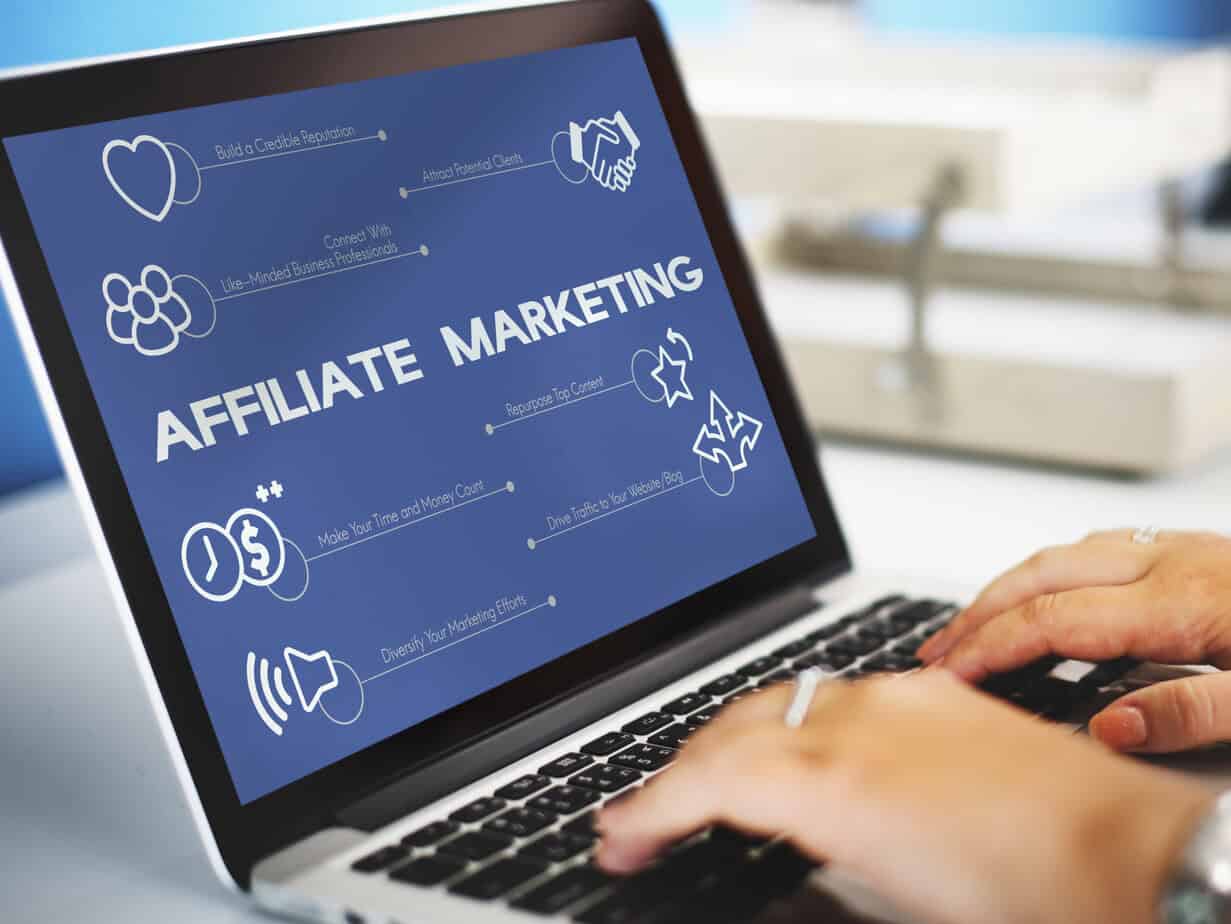
One last thing before we dive into the options, to make sure you get the right software for your brand, you need to ask yourself some questions:
What Stage Is Your Brand At?
Are you a lean start-up looking to build brand profile quickly? Or maybe you’re an established brand with an existing programme of partners. Get clear on what stage you’re at and how much budget you’ve got to spend. Don’t just think about where you are now, but also want to be in 6 months or a year’s time. You don’t want to have to change software a few months down the line.
What Tools Are You Currently Using?
If your brand already relies on multiple tools, strong API integrations are essential. They let you connect your partner platform with your existing systems and ad networks, streamlining setup and ensuring data flows smoothly across your business. For example, if you use Shopify for e-commerce, then you need an affiliate marketing platform which seamlessly integrates with it so you can automatically sync sales and affiliate data.
How Much Data Do You Need?
To assess the success of your marketing efforts, you need data, but you need to think about exactly how much data you can handle without getting overwhelmed. I would always recommend looking for multi-touch attribution. It allows you to track every interaction along the purchasing journey rather than just the last partner before a sale. It means you can see which affiliates, influencers, or ad campaigns actually move customers from awareness to purchase. If you’ve got a large partner marketing programme with multiple channels, then you should also think about cross-channel tracking. It lets you see all your performance data, from affiliates to PPC, influencers, and media buyers, in one place.
How Much Time and Technical Expertise Does Your Team Have?
Even the best software can fail if the rollout isn’t handled properly. That’s why it’s essential you consider how much time and technical knowledge you have – there’s no point signing up for an enterprise product which you and your team will never learn how to use. That said, don’t be put off by complex products; software like Everflow comes with training and onboarding to make the learning curve easier.
Best Affiliate Marketing Software for Brands
Now let’s turn to my top software recommendations.
Everflow
Pricing: Custom (mid–high range, based on usage).
Best for: Brands looking for an all-in-one solution which covers affiliates, influencers, and paid media.
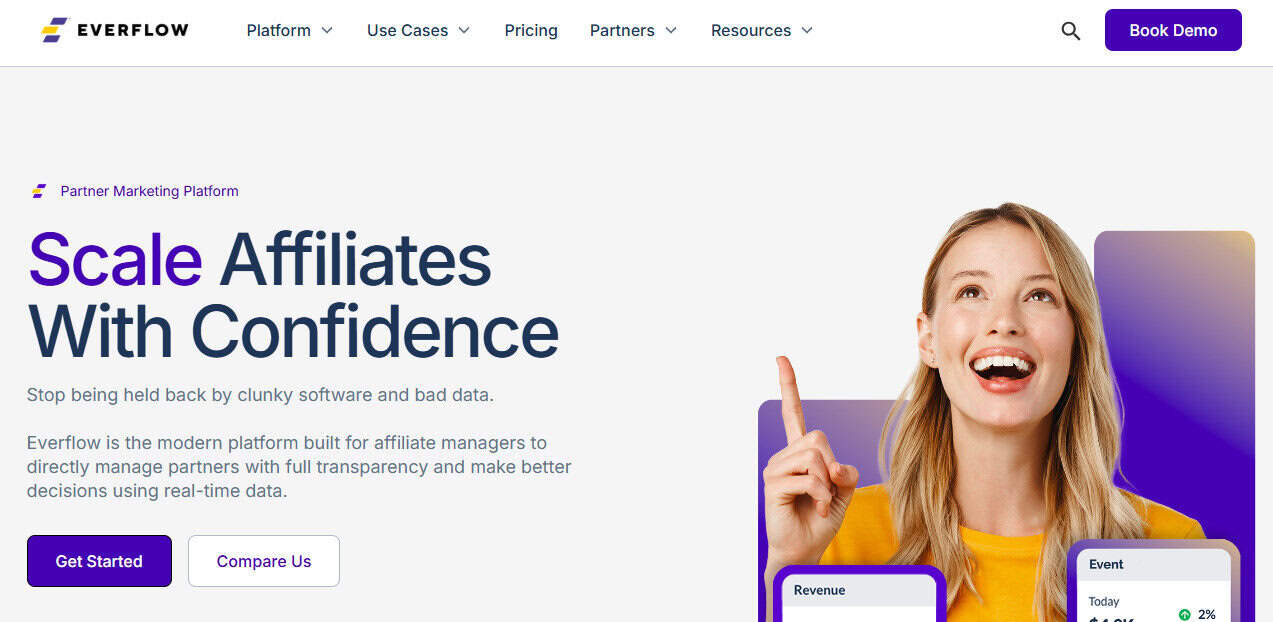
Everflow is at the top of my list because, in my view, it’s the best all-rounder on the market (and it’s the affiliate software that I now use in my business). It gives brands complete visibility across every performance channel, including affiliates, influencers, and paid media, all in one easy-to-read dashboard.
It comes with all the data you need to track and optimize your affiliate marketing, plus you get access to its impressive partner marketplace via Skimlinks, which I have found incredibly useful for scaling my affiliate marketing program.
What It’s Great for:
- Managing affiliates, influencers, and media partners in one place
- Advanced analytics and real-time reporting
- Fraud protection and multi-touch attribution
- Seamless integrations with Shopify, PayPal, and CRMs
- Partner marketplace access via Skimlinks
Drawbacks: Takes a bit of time to implement, and it’s one of the more expensive options on the market. However, I think the amount of features more than makes up for the price, and it comes with tons of onboarding support to get you up to speed.
Impact
Pricing: Custom enterprise pricing.
Best for: Enterprise and global brands with complex, multi-region programs.
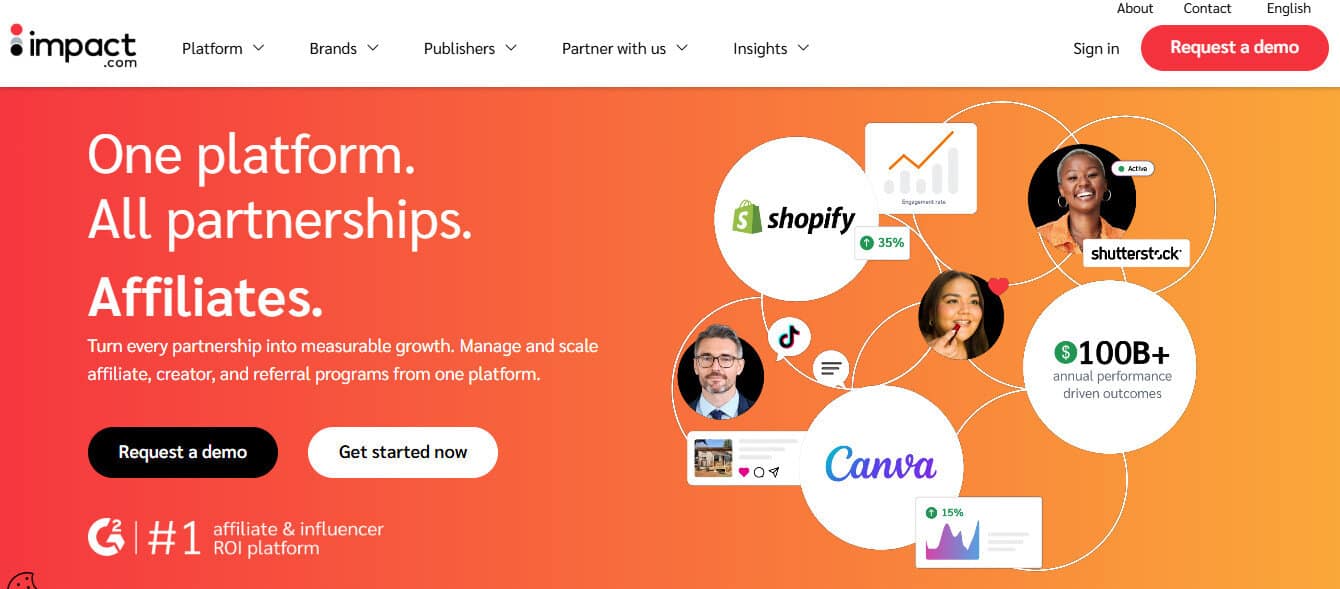
Impact is used by a lot of global brands with multinational programmes because its powerful platform is great at managing complex, multi-region programs. Through the platform, you can automate almost every operational task, from contracts and compliance to payments and performance tracking.
As you would expect with an enterprise-level programme, it provides advanced analytics and custom reporting, so global marketing teams can get a unified view of how their partnerships perform in every market around the world.
What It’s Great For:
- Global compliance, contracting, and payment automation
- Managing multiple partner types, including affiliates, influencers, and B2B
- In-depth analytics and reporting
- Enterprise-grade scalability
Drawbacks: Complex setup and higher learning curve, so I would only recommend it to experienced teams with technical expertise.
PartnerStack
Pricing: Custom (typically mid–high range).
Best for: SaaS and B2B brands building referral or reseller ecosystems.
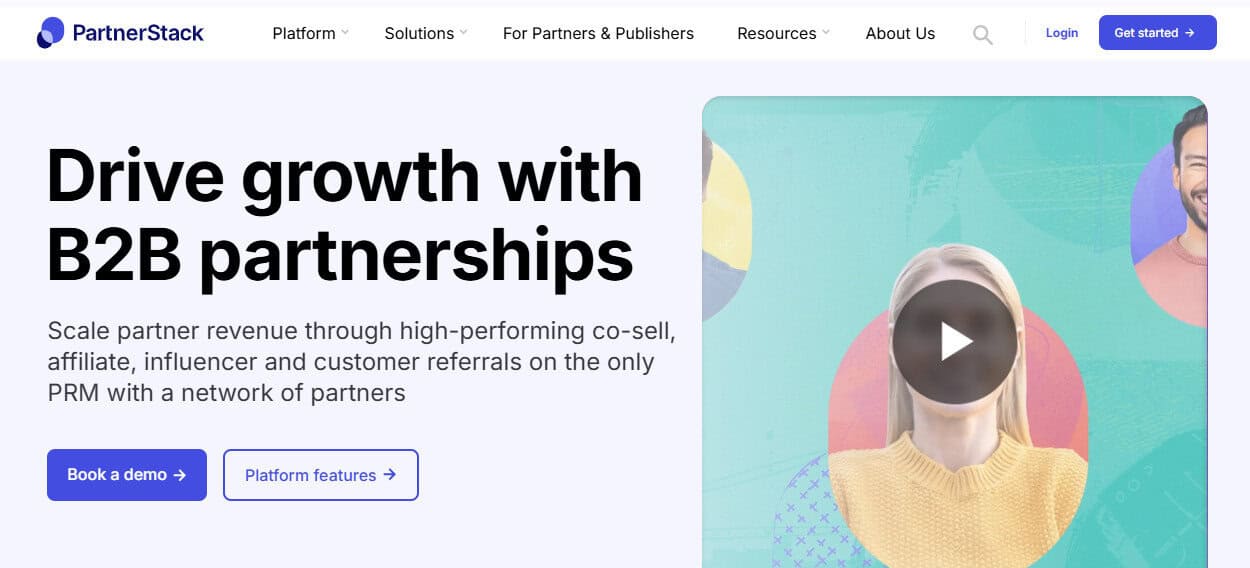
PartnerStack is aimed at SaaS and B2B companies that rely on long-term customer relationships and recurring revenue, allowing you to easily track recurring commissions and high-performing partners. Like Everflow and Impact, it also allows users to manage affiliate, referral, and reseller programs all within the same platform. It comes with sophisticated automation options so you can automate commission payouts, partner onboarding, and engagement with ease.
It also comes with a built-in partner marketplace, which means you can recruit and develop relationships with the right affiliates to build your affiliate program quickly and easily.
What It’s Great For:
- Running affiliate, referral, and reseller programs together
- Built-in partner marketplace for recruitment
- Recurring commissions and CRM integrations
- Designed for SaaS and subscription models
Drawbacks: Comes with a higher price and setup complexity than more lightweight tools.
Refersion
Pricing: From $39/mo + 3% of affiliate sales.
Best for: DTC and e-commerce brands that want to track influencers and affiliates easily.
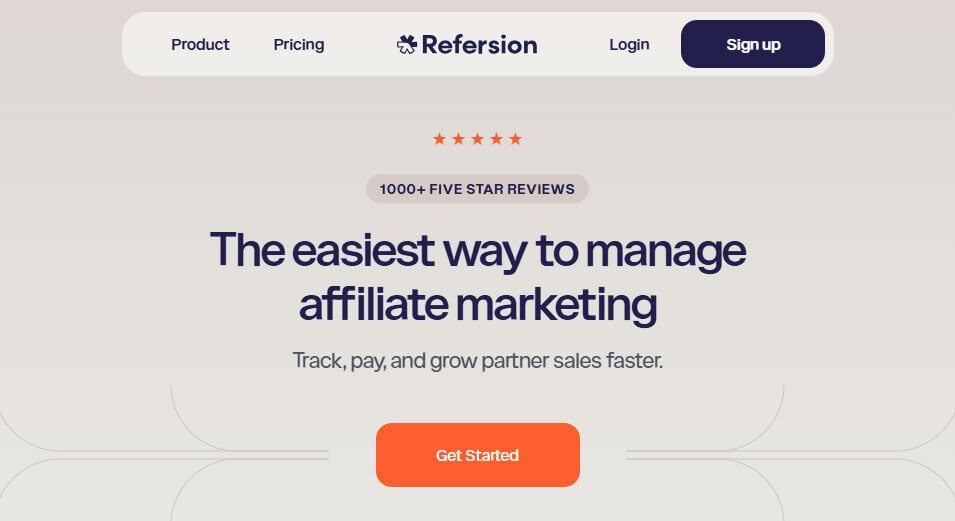
Refersion is aimed at direct-to-consumer (DTC) and ecommerce brands, as it integrates seamlessly with most major ecommerce platforms like Shopify, WooCommerce, and BigCommerce. Another nice feature which might particularly appeal to e-commerce brands is the custom-branded dashboards for affiliates, which allows you to reflect your brand identity through every interaction.
Like all the options in this list, it comes with real-time reporting so you can monitor sales performance in real time. It also has a built-in affiliate and influencer marketplace, where you can discover and recruit new partners who already have established audiences in your niche.
What It’s Great For:
- Seamless Shopify and WooCommerce integrations
- Built-in influencer and affiliate marketplace
- Fast setup and intuitive interface
- Custom-branded affiliate dashboards
Drawbacks: The features are a bit limited for SaaS or businesses with enterprise-level programs.
Tapfiliate
Pricing: From $89/mo.
Best for: Growing brands that want clean branding and flexibility.
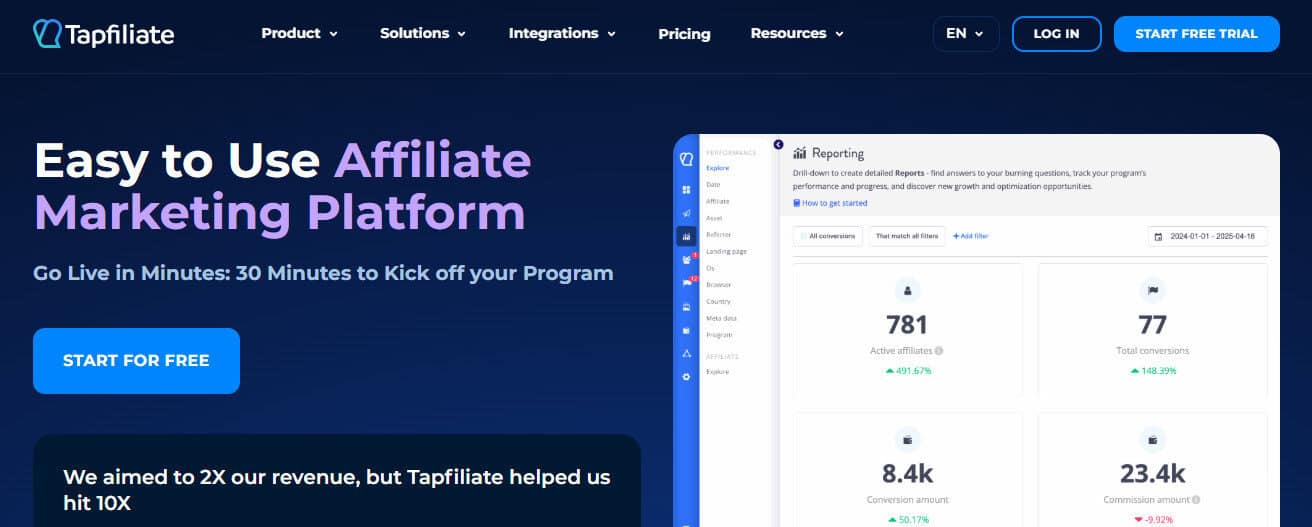
Tapfiliate is more simplistic than the other options listed, but I’ve included it because it can be a great fit for growing ecommerce and SaaS brands that want to scale their affiliate marketing without complex setup or enterprise-level costs.
It comes with a clean, intuitive interface and integrations with tools like Shopify, Wix, Stripe, and WooCommerce, so you can start tracking affiliates and recurring commissions quickly. It doesn’t offer the deep analytics or automation of platforms like Everflow or Impact, but it does come with a couple of impressive features like white-label dashboards and multilingual campaigns.
What It’s Great For:
- Simple and intuitive setup and cost-effective pricing
- Easy integrations with Shopify, Stripe, and Wix
- White-label dashboards to reflect your brand
- Recurring and lifetime commission options
- Multilingual support for international programs
Drawbacks: Analytics and features are more basic than other enterprise tools.
Partnerize
Pricing: Custom enterprise pricing.
Best for: Global retailers and large consumer brands.
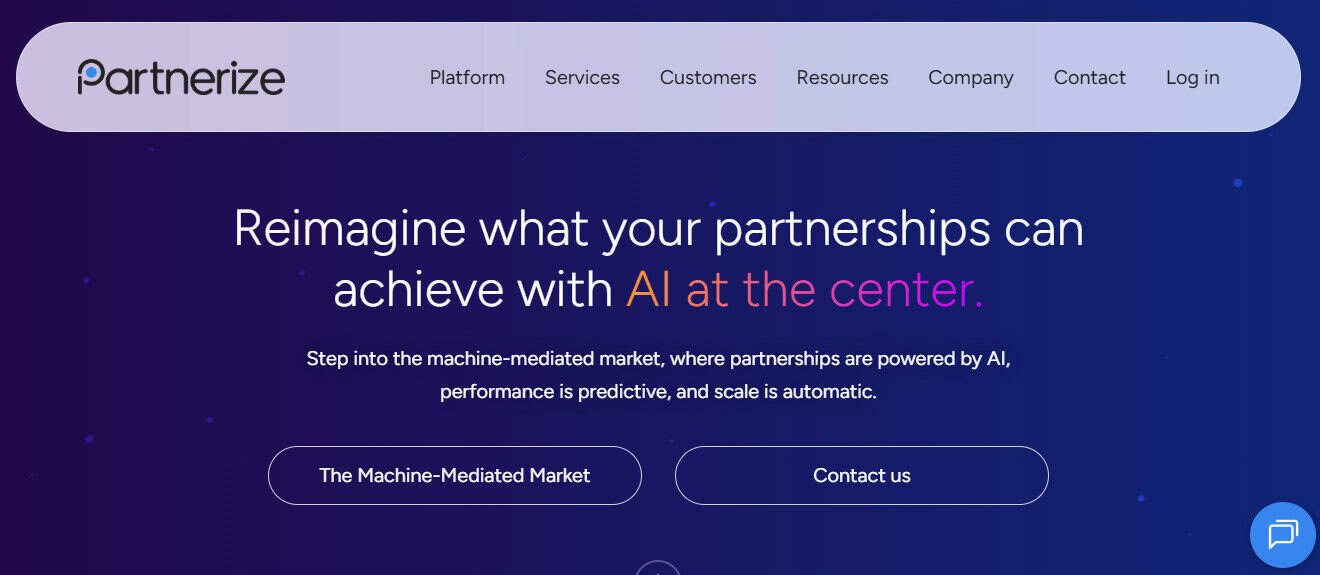
Partnerize is a powerful, enterprise-level platform made for global retailers and big consumer brands with large partnership programs across multiple markets. It comes with sophisticated automation options for approvals, contracts, and payments, as well as in-depth analytics and partner discovery. Global brands can access detailed reporting by region and partner type, helping marketers understand which relationships are delivering the best return across their global program.
It’s an impressive affiliate marketing software, but I think the number of features and depth of data makes it overkill for smaller businesses.
What It’s Great For:
- Managing complex, global partner programs
- Advanced campaign automation and analytics
- Partner discovery and relationship tools
- Built-in brand safety and compliance features
Drawbacks: It’s complex and time-intensive to set up and comes with enterprise-level pricing.
Awin
Pricing: Commission-based (varies by brand size and campaign).
Best for: Established brands focused on reach and exposure.
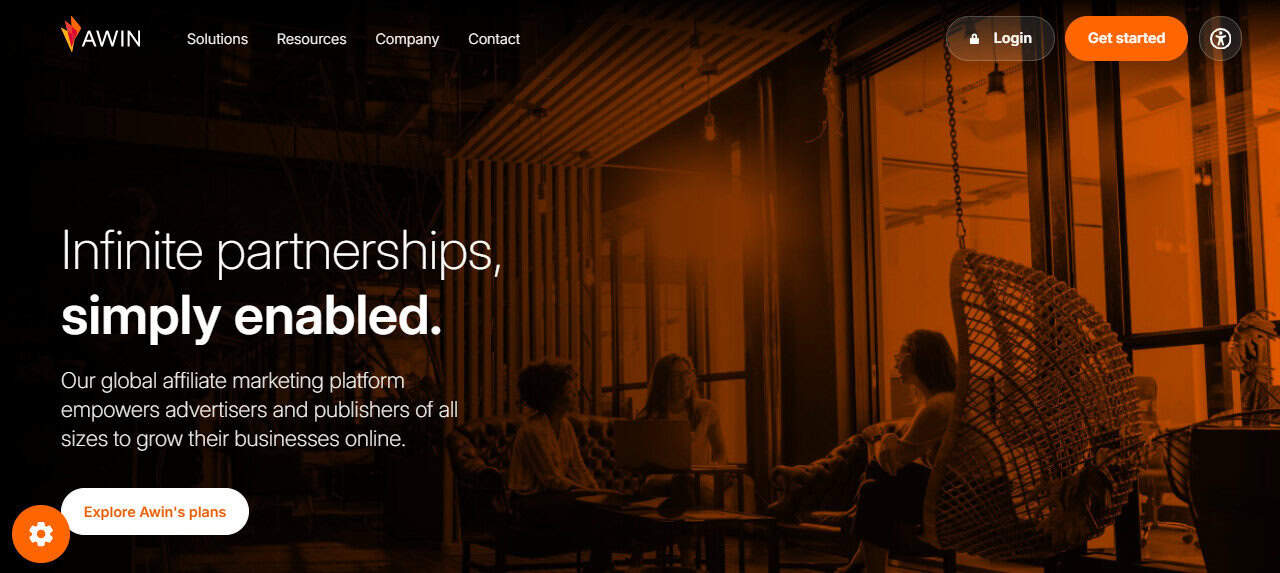
I’ve included Awin as it’s one of the largest and most established affiliate networks in the world, connecting brands with over 270,000 active publishers and media partners across every major industry. Through Awin, brands can get direct access to premium publishers, bloggers, and content sites, enabling brands to expand their reach without having to recruit partners manually or worry about compliance.
It offers some management and optimization tools, such as tracking, reporting, and creative asset management, and it also offers a managed service option for brands that want to outsource their affiliate relationships. That said, it doesn’t come with the same flexibility or customization you get with some of the other options in this list.
What It’s Great For:
- Access to thousands of pre-vetted publishers
- Built-in compliance and brand-safety checks
- Managed services for affiliate recruitment and optimization
- Strong global presence and reliability
Drawbacks: Less flexibility for customizing program structures.
Summary
All of the software options I’ve mentioned come with a range of useful features, but working out which one is best for you will depend on your brand’s size, goals, and partnership strategy. For example, if you’re a startup ecommerce brand or SaaS business, tools like Refersion and Tapfiliate offer affordable, easy-to-manage solutions, while global brands would be advised to look at enterprise-level options like Partnerize.
If you’re unsure which camp you fit into, I recommend checking out Everflow. It offers all the features a growing brand could need within one easy-to-use platform. And thanks to the hands-on onboarding process, you don’t need to worry about the setup or implementation.

